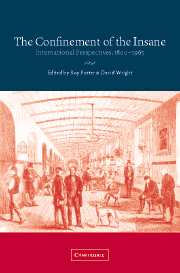Book contents
- Frontmatter
- Contents
- List of figures
- List of tables
- Notes on contributors
- Acknowledgements
- Introduction
- 1 Insanity, institutions and society: the case of the Robben Island Lunatic Asylum, 1846–1910
- 2 The confinement of the insane in Switzerland, 1900–1970: Cery (Vaud) and Bel-Air (Geneva) asylums
- 3 Family strategies and medical power: ‘voluntary’ committal in a Parisian asylum, 1876–1914
- 4 The confinement of the insane in Victorian Canada: the Hamilton and Toronto asylums, c. 1861–1891
- 5 Passage to the asylum: the role of the police in committals of the insane in Victoria, Australia, 1848–1900
- 6 The Wittenauer Heilstätten in Berlin: a case record study of psychiatric patients in Germany, 1919–1960
- 7 Curative asylum, custodial hospital: the South Carolina Lunatic Asylum and State Hospital, 1828–1920
- 8 The state, family, and the insane in Japan, 1900–1945
- 9 The limits of psychiatric reform in Argentina, 1890–1946
- 10 Becoming mad in revolutionary Mexico: mentally ill patients at the General Insane Asylum, Mexico, 1910–1930
- 11 Psychiatry and confinement in India
- 12 Confinement and colonialism in Nigeria
- 13 ‘Ireland's crowded madhouses’: the institutional confinement of the insane in nineteenth- and twentieth-century Ireland
- 14 The administration of insanity in England 1800 to 1870
- Index
5 - Passage to the asylum: the role of the police in committals of the insane in Victoria, Australia, 1848–1900
Published online by Cambridge University Press: 24 July 2009
- Frontmatter
- Contents
- List of figures
- List of tables
- Notes on contributors
- Acknowledgements
- Introduction
- 1 Insanity, institutions and society: the case of the Robben Island Lunatic Asylum, 1846–1910
- 2 The confinement of the insane in Switzerland, 1900–1970: Cery (Vaud) and Bel-Air (Geneva) asylums
- 3 Family strategies and medical power: ‘voluntary’ committal in a Parisian asylum, 1876–1914
- 4 The confinement of the insane in Victorian Canada: the Hamilton and Toronto asylums, c. 1861–1891
- 5 Passage to the asylum: the role of the police in committals of the insane in Victoria, Australia, 1848–1900
- 6 The Wittenauer Heilstätten in Berlin: a case record study of psychiatric patients in Germany, 1919–1960
- 7 Curative asylum, custodial hospital: the South Carolina Lunatic Asylum and State Hospital, 1828–1920
- 8 The state, family, and the insane in Japan, 1900–1945
- 9 The limits of psychiatric reform in Argentina, 1890–1946
- 10 Becoming mad in revolutionary Mexico: mentally ill patients at the General Insane Asylum, Mexico, 1910–1930
- 11 Psychiatry and confinement in India
- 12 Confinement and colonialism in Nigeria
- 13 ‘Ireland's crowded madhouses’: the institutional confinement of the insane in nineteenth- and twentieth-century Ireland
- 14 The administration of insanity in England 1800 to 1870
- Index
Summary
Australia's European population arrived in 1788, transported from the British Isles to establish New South Wales as a penal colony. In the first few years of settlement, David Collins, legal advocate on the First Fleet and chronicler of the early history of the colonies, commented on the existence of insanity among convicts. Policies, legislation and practices surrounding insanity in the different Australian colonies developed over the next ten decades. Subsequent histories of the insane in nineteenth-century Australia, following the trajectory of British scholarship on asylumdom, have largely been explored through institutional records. Historians have been interested in exploring the broad concept of asylum committals, and have considered the relationships between agencies of the law, including police and the courts, families and asylums. The custodial character of the colonial asylum meant that ‘public disturbances’ could result in asylum committals, rather than imprisonment, for women and men. Colonial policing practices of detection and surveillance, and the policing of sex and race, were central to the apprehension of lunatics. Families negotiated with the police in many instances, and the police played roles as intermediaries between the asylum and the families of lunatics. This chapter examines the development of policing practices around lunacy and the asylum in the colony of Victoria in the nineteenth century.
The history of the asylum in colonial Victoria was not unique, and is usefully compared to the histories of other Australian colonies and also the colony of New Zealand.
- Type
- Chapter
- Information
- The Confinement of the InsaneInternational Perspectives, 1800–1965, pp. 129 - 148Publisher: Cambridge University PressPrint publication year: 2003
- 4
- Cited by

